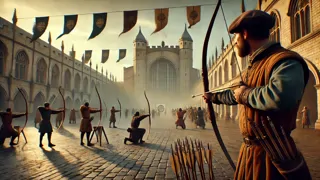Introduction
In the heart of medieval England, Sherwood Forest unfolds like a vast tapestry of ancient oaks, their gnarled branches weaving a canopy that filters shafts of golden light onto the mossy floor below. Mist clings to the undergrowth as dawn stirs the hidden world beneath leaf and bough, carrying the distant cries of hawks and the low murmur of a population struggling under Prince John's heavy taxes and the merciless grip of the Sheriff of Nottingham. From this realm of shadow and sun emerges a figure cloaked in emerald and resolve: Robin of Loxley, a nobleman turned outlaw whose keen arrow and unwavering heart will echo through time. Born to gentle blood but hardened by war, he returns to find his people burdened by greed and cruelty, and he turns from sword to longbow, pledging to redistribute the wealth hoarded by the corrupt. With each whispered tale around village hearths, the name Robin Hood kindles hope and fear in equal measure: the champion of the poor, the bane of corrupt authority, and a symbol of justice as raw and untamed as the forest he calls home. Here, beneath the rustle of leaves and the echo of hoofbeats, begins the legend of a man who would reshape the balance of power, forging alliances among the disinherited and sparking a rebellion cloaked in heroism and stealth.
The Rise of the Outlaw in Sherwood
In the years after Robin of Loxley returned from the distant battlefields of the Crusades, he found his ancestral lands seized by a crown hungry for coin and obedience. Across Nottinghamshire, once-thriving villages lay under the heavy yoke of Prince John's coffers, while the Sheriff of Nottingham enforced new levies with an iron fist. Fields that once fed families now emptied their bounty into royal granaries, and peasants suffered beneath the weight of taxes that demanded their very livelihoods. Sherwood Forest, a realm of green shadow and rustling leaves, became his sanctuary and his stronghold, a labyrinth of ancient oaks and hidden glades where no tax collector could follow. Driven by memories of justice denied, Robin cast aside his noble title and wove a new identity from the living tapestry of the forest. Clad in supple leather dyed the deep green of moss and pine, he learned to move with the wind, to track the glimmer of a noble’s gait, and to disappear as though he were no more than a whisper among the leaves. Between the towering trunks, he found more than a hiding place; he discovered a sense of purpose that pulsed in the woodland shadows. Every rustle of undergrowth became a signal, every birdcall a counsel; the rhythms of Sherwood guided him toward a destiny forged not by birthright but by defiance. With each passing dawn, Robin's resolve crystallized: he would turn the forest's secrets against the tyranny threatening his homeland, carving a path that challenged the authority of prince and sheriff alike.

Driven by a fierce sense of duty, Robin began his first acts beneath the boughs of Sherwood. It started as a covert interception of a gold-laden carriage that trundled along a rarely used track—though the road was seldom traveled, the convoy gleamed like a beacon to those whose hope lay in fairness rather than fortune. Robin’s nimble footfalls left barely a whisper in the leaf litter as he scaled a fallen log and loosed his first arrow at the crest of a hill. The bolt flew true, pinning the sheriff’s herald to the carriage door and sending a clear message: the forest had a new guardian. Pillaging not for greed but for restitution, he relieved each pursy baron of excess coin, ensuring the widow could buy seed for her field and the orphan might taste bread. Word traveled fast as laughter rippled through villages, and whispered rumors reached even the granite halls of Nottingham Castle. Each raid was executed with military precision and the silent grace of a hunter perfected by necessity. Robin’s arrows sang through the air at twilight, each release a defiance against unchecked authority. Scouts of the local lords grew wary of the emerald-clad specter, never certain where he would strike next. In a single month, he recovered fortunes greater than many expected he could yield, yet he distributed every single coin to those who needed it most, concealing his cache in hollow trees and time-worn hollow logs to return again at need. Intrepid, audacious, and guided by an unbreakable moral code carved as deeply as the forest itself, Robin Hood transformed from a lone archer to the leader an entire cause would rally behind—one arrow, one promise, and one heart committed to a singular idea: justice for all, from the leaf-soaked paths of Sherwood to the royal courts that plotted his downfall.
As his legend stretched beyond the forest canopy, Robin Hood’s name became both hope and curse for many across Nottinghamshire and beyond. Tavern gossip, carried on the ale-scented stale air, spoke of a phantom who emerged from moonlit shadows to right grievous wrongs. Peasants left loaves of freshly baked bread at the edge of the forest, marked with a small knot of green ribbon—a token of gratitude—and the next morning, they would wake to find sacks of gold replacing their meager offerings. Meanwhile, the ruling nobles and highborn barons grew increasingly frantic, dispatching patrols of mounted knights to scour every glade, thicket, and glen in search of their elusive foe. Yet no serpent’s nest of mantraps nor network of well-fed hounds could ensnare him; Sherwood seemed to conspire in his favor, presenting narrow chasms where arrows could rain unchallenged and hidden streams that muffled the sound of footfalls. Each venture into enemy territory further sharpened his skills—mastery of disguise, proficiency with hawk and hound, the art of reading wind patterns to preempt archers’ aims. Over time, he crafted an informal code: never to shed innocent blood, always to aid the oppressed, and only to aim at those who stood in the way of justice. Thus, in the hearts of the common folk, Robin Hood evolved from a solitary shadow into a symbol of collective resistance—a promise that tyranny would not extinguish the flame of freedom. Through whispered chants around hearth fires and the clandestine passing of folded notes, his legend entwined itself with the very roots of Sherwood, promising that wherever evil lured its forces, there would also shine the arrow’s path toward justice. Even the forest fauna seemed to acknowledge his presence: deer paused mid-stride, squirrels darted noisily through branches, and owls observed in silent vigil as he moved through the twilight gloom. Tales whispered that the ancient spirits of Sherwood itself had taken his side, guiding his aim and shielding his footsteps. In this way, the legend of Robin Hood became forever entwined with the spirit of the woodland, a story carried in every whisper of wind and every rustle of leaf.
Allies and Adversaries
In the hush of early dawn, beside a crooked yew tree arching across a babbling brook within Sherwood’s depths, Robin Hood first encountered the towering figure of Little John. A man of prodigious stature with a keen wit beneath a tangle of auburn locks, Little John surprised Robin with a bold challenge: a quarterstaff fight upon a narrow wooden bridge. It was a contest born of curiosity and honor, each imposing blow echoing amid the towering oaks and reflecting in the swift current below. Though he towered over Robin’s lithe frame, John’s heart recognized a kindred spirit, yielding the final strike with laughter in his booming voice. From that day forward, Robin’s band found in Little John both a loyal friend and a bulwark against the castle’s armed patrols. Not far from that riverbank, in a crumbling abbey nestled beneath the forest’s edge, Friar Tuck found his cause. Though his holy vows bade him tend to spiritual matters, he could not ignore the suffering he witnessed in the surrounding villages, and he joined Robin’s cause with hearty zeal. His stout frame and unexpected mastery of the mace often rescued the group from close calls, and his rum-soaked laughter echoed among the pines like a beacon of solidarity. Will Scarlet, Robin’s kin by blood and bound by a shared sense of justice, emerged from the cloaked alleys of Nottingham with blade at wrist and satchel full of spirited jests. Each member brought a unique talent and perspective—stealth, strength, or sacred fervor—yet they converged under a single creed: to shield the innocent and undermine the corrupt. Through whispered campfire meetings beneath moth-eaten tents pitched among twin oaks, they mapped patrol routes, recounted tales of injustice, and chanted songs that blended martial strategy with hopeful defiance. As the seasons turned, their numbers grew to include archers, trackers, and even those who faltered under Prince John’s edicts and sought refuge in Robin’s code. Each newcomer learned to read the forest as their father’s hearth, to move in silent harmony with the wind, and to use their skills in service of a world unclouded by avarice. Yet, for all their camaraderie, it was the unexpected bonds—the laughter shared over a stolen cheese wheel, the silent nods of reassurance before a midnight raid, the elderly widow’s tears of relief—that forged them into a league far stronger than any blade or bow.

Beyond their core fellowship, Robin Hood’s circle welcomed remarkable allies from unexpected corners of the realm. Most notably, Lady Marian of Doncaster emerged from royal courts cloaked in the guise of a humble herbalist, her intelligence matching her grace. Though her highborn status should have distanced her from matters of outlawry, Marian could not stand idle as her people suffered and secretly plotted alongside Robin by exchanging coded letters tucked within hollowed-out beams. Her skills in healing and espionage proved invaluable—each poultice she administered, and each intercepted missive she deciphered strengthened the Merry Men’s resolve. Along with Marian came the minstrel Alan-a-Dale, whose lilting ballads wove tales of defiance, stoking the hearts of villagers from Yorkshire to the Welsh marches. His songs, carried by wandering minstrels and sung in market squares, cloaked vital intelligence in rhyme, alerting peasants to gather at appointed meeting spots when tyranny sought to silence them. Under the watchful eye of Friar Tuck, who negotiated with sympathetic clergy to shelter women and children, the group’s network became both intricate and formidable. Each member, whether noble-born or lowly-born, discovered purpose in these clandestine efforts, forging a tapestry of unity across social divides. Among them thrived Will Scarlet’s rakish humor, which disarmed tension during long stakeouts, and the swift wit of Martha, a young shepherdess who guided scouts through lesser-known trails around the edges of Welbeck Wood. Even the bumbling courier who initially betrayed the band under duress found redemption by training as a lookout, offering vital warnings when royal forces advanced. As the company grew, so did the complexity of their operations: they orchestrated coordinated diversions in Nottingham to draw armed patrols away from deeper incursions, while shifting valuable hoards beneath the canopy in hollowed stumps. Every morning after a victorious raid, the outlaws convened beneath a vast sycamore to distribute supplies, share intelligence, and remember the burdens that initially drove them into the forest’s embrace. These rituals tempered their resolve, reminding them that the fight was not for glory, but for the families they left untouched by rapacious edges of power.
But for every ally who joined Robin Hood’s ranks, a more formidable adversary emerged to test their unity. At the center of this storm stood the Sheriff of Nottingham—Sir Guy of Gisborne—whose warped sense of justice bordered on obsession. Clad in gleaming mail and mounted upon a destrier bred for war, he pursued the outlaw with relentless determination, his sharp eyes trained to detect the faintest disturbance in Sherwood’s deep shadows. Behind him, Prince John, cloistered in Nottingham Castle, orchestrated ever-harsher edicts to lure Robin Hood into a trap; famine stalked the land as taxes burgeoned, and dissension sprouted even among those previously loyal to the crown. With hawk-like precision, royal messengers spread wanted posters depicting Robin’s face above a reward so steep it threatened to turn friend against friend. Undeterred, the Merry Men embraced each challenge as an opportunity, employing their network of spies to anticipate every knightly chevauchée. Under cover of moonlight, they infiltrated garrison kitchens to purloin provisions, while archers disguised as charcoal burners disrupted supply lines at wooded crossroads. The conflict between outlaw and authority transcended simple theft; it became a testament to the ingenuity of the oppressed, a narrative woven into every stolen loaf and rescued child. Rumors even spread that the Sheriff resorted to supernatural methods, consulting mysterious soothsayers to unearth the outlaw’s weaknesses, yet no incantation could pierce the loyalty Robin inspired. The townsfolk, once cowed by fear, began forging secret alliances: blacksmiths providing sharpened arrows, farmers stashing fresh horses at hidden stables, and even disillusioned courtiers delivering secrets of the court under the cloak of darkness. Each act of solidarity wove a new thread into the tapestry of resistance, and every narrow escape became a testament to faith in one man’s vision for equity. In the glare of torchlit betrayals and the hush of midnight councils, the war between the green-clad archers and John’s armored legions unfolded as a chronicle of cunning courage—punctuated by the whistle of arrows and the defiant laughter that echoed through Sherwood’s ancient bowers.
The Long Bow of Justice
As the autumn moon cast silver beams upon Sherwood’s veiled paths, Robin Hood and his band prepared for their boldest endeavor yet: the archery contest held within the shadow of Nottingham Castle. Prince John had declared a grand prize—a golden arrow encrusted with gems—to the archer whose skill surpassed all others, hoping to lure the elusive outlaw into the open. Seated in the grandstands with wry amusement, the Sheriff of Nottingham and his knights eyed the competitors with weary suspicion, unaware that Robin Hood had slipped among them in the guise of a humble forester. Clad in simple garb, he blended seamlessly with the other yeomen, though his confidence betrayed him as he lifted the longbow crafted in Sherwood’s workshops. When his turn arrived, silence fell like a velvet cloak over the courtyard; villagers held their breath as the bowstring snapped with precise tension, sending the arrow arcing through crisp air and landing dead center in the target’s bullseye. The crowd erupted in stunned applause as Robin retrieved the gleaming prize—and instead of presenting it to Prince John, he raised it high and hurled it into the throng of gathered peasants, declaring that justice could never be bought nor sold. Before the contest, Robin had rallied his faithful scouts to prepare diversions at every exit, setting rope splints to loosen hinges and placing concealed traps upon enemy horses. The impassive archers bore witness to his unerring aim as the target trembled, each arrow an act of defiance resonating like thunder in the ears of captive onlookers. When a heavy rain began, turning course to the advantage of his woodland training, Robin paused only to cast a knowing glance at his comrades, whose nods conveyed silent affirmation of their shared purpose: to show that resourcefulness and unity could outwit even the greatest fortress. Through the riot of astonished gasps and gleeful cheers, Robin Hood emerged not merely victorious, but immortalized in a single triumphant gesture—reminding every soul that the arrows of change can strike where least expected.

While Robin claimed his victory in Nottingham, Lady Marian worked in concert with the outlaw’s network to thwart the Sheriff’s trap laid beyond the castle gates. Disguised as a royal messenger, she intercepted clandestine orders that would have cornered Robin’s scouts near the old mill, and she pressed her fine fingers to crucial seals, redirecting the letters to benign addresses. The Sheriff’s men, confused by faulty receipts and ghostly riders who vanished at first light, found themselves chasing shadows through muddy ditches. Meanwhile, Robin’s allies rallied the commoners with Marian’s careful instructions, guiding them to stash supplies where the patrols would least suspect. As dawn approached, whistle signals echoed through the forest like a chorus of wind chimes, and the band slipped away with provisions pilfered from the castle’s stores—enough to feed a dozen villages for weeks on end. In the swirl of chaos, Marian and Robin exchanged but a single, charged glance beneath the gnarled limbs of an ancient oak—a silent promise that they would one day celebrate a freer kingdom together. These nocturnal maneuvers, more ballet than skirmish, became the stuff of ballads recounted by minstrels across kingdom halls, each retelling preserving the ingenuity that separated Robin Hood from mere brigands. When the smoke cleared and the morning mists lifted, the Sheriff discovered that not only had his golden arrow disappeared back into the forest’s embrace, but also that his own coffers had been lightened, his network exposed, and his reputation tarnished beyond the walls of Nottingham Castle. Mired in frustration, Sir Guy of Gisborne tightened his gauntlets and swore vengeance, while Prince John—humiliated before his court—fumed hidden behind the iron gates, issuing proclamations that branded Robin Hood a traitor and saboteur, yet each emotive decree only stoked the fires of solidarity among the realm’s disenfranchised. Mothers tucked Marian’s coded verses under loaves, blacksmiths forged arrows in secret furnaces, and children scampered along forest trails delivering messages that would once have spelled certain doom. It was in these small, determined acts that the true power of Robin’s crusade lay—not in the raid upon the castle, but in the whispered conviction that every soul bore a stake in the struggle for fairness. In this tapestry of twilight strategy, Robin and Marian forged an alliance that would last a lifetime, sealed by honor, arrow, and unbreakable trust.
As winter’s chill settled over Nottinghamshire, the saga of Robin Hood transcended every hearth and hall, igniting embers of resistance where despair had once reigned. Postmasters carved his likeness onto wooden signs pinned to doors; children fashioned archery targets in his honor; and travelers whispered of a mysterious benefactor who delivered grain to drought-stricken hamlets in the dead of night. Beyond the forest’s borders, noble sympathizers donated coin to clandestine wartime efforts, funding educational initiatives for orphaned children and medical remedies for wounded veterans—projects Robin urged his allies to pursue in tandem with their woodland campaigns. Even Prince John, besieged by rebellion and haunted by rumors of a looming baronial uprising, found himself compelled to temper his cruelty, if only to placate an increasingly restless populace. Robin Hood’s actions demonstrated that the true currency of leadership lay in compassion, collaboration, and the indomitable spirit of those brave enough to stand for what was right. In the hallowed canopy of Sherwood itself, oak and ash trees still bear witness to the silent meetings held beneath shooting stars, and the wind whispers of an archer whose arrows flew truest when guided by empathy and sacrifice. Each drop of morning dew glimmers with the reflection of his legend, reminding forest dwellers that their lives are intertwined with tales of heroism. Scholars pore over ancient manuscripts to debate the truth of his deeds, while poets across the globe still draw inspiration from the outlaw’s unwavering stand against tyranny. Robin Hood’s story, both mutable and timeless, endures as a testament to the belief that even in the darkest hours, a single soul can ignite the dawn.
Conclusion
In the tapestry of English folklore, few figures shine as brightly as Robin Hood, the emerald-clad outlaw whose arrows transcended mere weaponry to become symbols of righteous rebellion. Through forests cloaked in shadow, he carved paths of resistance, reminding every man and woman that the pursuit of justice demands courage and compassion. His legend, born of defiance against royal injustice and nurtured by bonds forged among the Merry Men, continues to bloom in modern hearts as a testament to collective solidarity. From clandestine midnight raids that emptied the coffers of corrupt nobles to whispered strategies exchanged beneath canopyed oaks, his story weaves through centuries, inspiring resistance against every form of oppression. Today, his spirit lives on wherever the marginalized gather courage, emboldened to shape their destinies. As travelers wander Sherwood’s winding trails, they still listen for the distant echo of an arrow’s flight, certain that the legacy of Robin Hood endures—ever vigilant and steadfast in its pledge: that the cause of the oppressed will never fall silent.


















